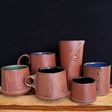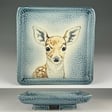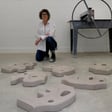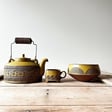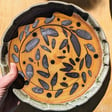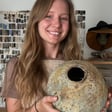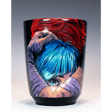Introduction to the Show
00:00:00
Speaker
When you're getting started making, you just don't realize how much work goes into making such a beautiful piece of artwork. If you love pottery and want to take your skills to the next level, you're in the right place. Find your own pottery style right here on Shaping Your Pottery with Nick Torres. Let's get
Major Setback in Pottery Journey
00:00:21
Speaker
started. Adam, welcome to Shape Your Pottery and share with me what's a failure you've experienced on your pottery journey that you believe many are heading for.
00:00:29
Speaker
I think you're gonna find failures at every stage of the process. I've had failures, well, I've been throwing, I've had failures hand building, I've had failures as stuff has been drying, I've had failures in the bis kiln, in the glaze kiln. Even when things are completely done, I've had pieces that I've dropped. You're gonna, I mean, that's the medium that we're working with, right? I think the worst failure you will deal with is losing an entire kiln. That happened to me summer of 21. I think I was working on a series that I called Calamity Farm. Super excited about it. Had all these farm creatures dealing with big explosions and bombs and all kinds of stuff going on. And I should have realized I was using
00:01:26
Speaker
the school killing at that time. And I was hauling my green wire back and forth, hauling my glazer back and forth. And the end of the year, something was up with the kiln. I could feel something was going on and I fired my stuff anyway, because I was excited about it. And everything overfired and it was a disaster. And I lost pretty much everything in that kiln. And when you do as much to each piece as I do, it would it hit hard.
00:01:55
Speaker
I actually took like probably a month off from working after that. I was just devastated, but I got back
Minimizing Kiln Errors
00:02:03
Speaker
to it. How can people minimize their mistakes when it comes to kiln stuff? Keep an eye on things. I fire with witness cones now. Wasn't doing that back then. Just kind of keep track of how things are firing. So you know, I,
00:02:22
Speaker
kind of should have known back then. And I mean, I was pretty early on in, in me knowing what I'm doing with the kiln. So I should have noticed I was taking a little longer for things. I should have noticed some pieces had started to look like they were over fired. And I kind of did, but I just went with it anyway. Absolutely loved that. So that's some excellent advice
Early Pottery Beginnings
00:02:45
Speaker
right there. So tell me the story, how you got started making pottery. Got a long and winded story here.
00:02:51
Speaker
I guess my first experience with pottery was high school. I went to a high school where we only had one art teacher who taught everything. We had one pottery class and no wheels. Everything was hand built, but I just loved building sculptures. So much so that I kind of invented my own class to the independent study and just kind of spent the whole semester just like working really faces and hands.
00:03:22
Speaker
It was fun, really fun. And then when I went to college, I didn't do any pottery at all. I didn't do ceramics at all. I just kind of fell in love with printmaking and like sculpture, which is interesting, right? The whole making movement in sculpture and inventing ways to have people interact with your piece it was just so exciting that I didn't.
00:03:50
Speaker
And I had access to wood shop. I had access to a printmaking shop. I had access to welding. ah I didn't want to make anything that was going to break. After graduating, I spent a couple of years just kind of doing my own art and then decided to go back to school to be an art teacher. Got my license and I started teaching elementary school art and I taught elementary for 10 years. And then I had an opportunity to move to the high school.
Advancing Skills and Teaching
00:04:20
Speaker
And it was at that time that I thought, you know, the one thing I don't feel comfortable with right now is throwing on a wheel and I might have to teach that. So I took a class at Northern Clay Center called Land of the Round Pots. And we just had like three hours once a week for like, I don't know, five, six weeks or something where you just sat down and you threw and guided by a a graduate student from the U, great class. It was fun. I learned a lot. And then I started teaching at the high school a couple of years ago by, and I had the opportunity to teach some pottery. And, you know, at first I'm just kind of barely staying ahead of the students, but it's exciting. Like the kids are really into it. They have a lot of fun in there. So I started picking up more and more pottery classes and spending some time like,
00:05:19
Speaker
before and after school, just like staying late and throwing on the wheel. Probably spent like 2018, 2019, 2017, maybe even just kind of playing around with forums, figuring things out. Kind of during that time, I think I went to my first sanctuary pottery tour. My wife taught me to get on and it was a lot of, a lot of cool pottery there. I think I was.
00:05:47
Speaker
Uh, started getting highly influenced by some of the potters that were there. I mean, I'll talk about this later, probably, but I saw Kipo prongly stuff and I saw suturel stuff and just kind of got like, Oh my God, look what you can do. You can put images on your pots. And so I started done this journey of like figuring out, Hey, there's something called underglaze you can use and there's this technique, else graffiti, or you can carve into it. And so like, almost like carving prints, like, oh, this is cool. So 2019, I think I'm getting into just like playing it around in the classroom a little bit after school with that kind of stuff.
Pandemic as a Creative Catalyst
00:06:32
Speaker
And then like the major catalyst that moved me into it was pandemic. A couple of things happened. March of 2020, I got sick.
00:06:45
Speaker
I got, I don't know what it was. I didn't know if it was COVID, if I was just had a flu or what it's like, the timing was weird. but So I had like a week where I had like a, you know, low temp and flu symptoms, but it did like after a week, it didn't go away. Like I ended up with this chronic fatigue syndrome where like I would be laid out on the couch for like 10 days. I couldn't move at the same time. Everybody got sent home and we had to teach from home.
00:07:14
Speaker
And so my wife said, you know, it might be a good idea for you to just take a wheel home and work in the garage for the summer and just kind of use that as like a rehabilitation, get back into things and maybe you just like a meditation, even feel better. I thought, okay. And so I set up a space in the garage and I spent that entire summer playing, making pots and playing with graffiti and got influenced by stuff Katie Miller was doing with the model print transfers. Sort of playing with that. I really got into that for a while, but yeah, that whole summer was huge. And that, that was kind of the point where pottery becomes my main art outlet. Why do you think that summer helped you so grow so much? Oh, just, just to have the dedicated time to play.
00:08:12
Speaker
having no expectations, right? like Nobody knew who I was. I didn't have any shows set up. I was just making for me. That was it. And so if I was influenced by something, I wanted to try that. I tried it. Absolutely loved that. Yeah.
00:08:31
Speaker
beation I absolutely love the shape edition. If you can find ways to have just dedicated time to just play and practice your pottery, your growth is going to skyrocket. I absolutely love that. Right. I still use my summers like that. I still dedicate time to just play. Yep, definitely. It's super important. So let's talk about
Illustrating Pottery
00:08:51
Speaker
your pottery. Can you tell me the story how you started making the hand-painted carved illustrations you make today? Yeah, kind kind of talked about being inspired by Kip's and Sutrael's work. And I guess what I was really inspired by was, you know, connecting with that, the animals that were on there and and the the farm animals in particular. I had grown up on a five acre hobby farm and I don't know, just kind of reminded me of, we used to raise chickens. We had pigs for a little bit. And like, so I connected with that a little bit. So.
00:09:28
Speaker
I always, I started my Scroofedo stuff with farm animals. Why do you enjoy adding illustrations to your pottery? Oh, I mean, for me, it's, it's the illustrated pots that I connect most with. Right. And you see behind me, my collection, you can see there's artists that illustrate their pots. I think what it does is it gives me that.
00:09:56
Speaker
that medium to incorporate my love for painting and drawing and printmaking in a functional object that somebody's going to use every day. I think that's fantastic. I think there's so many different ways that you can approach pottery that just makes it fascinating. But I'm just drawn into that illustrated work. Makes that personal connection with the viewer. Tell me more about that personal connection with the viewer.
00:10:25
Speaker
I think with the animals, you everybody has their own experience with animals and kind of taps into their own memories of different ways they've interacted with animals. That might be completely different than my intention with them, but it's great, right? Like if I put a chicken on on a pot and somebody thinks about how their grandma used to have chickens and they have that memory of being on grandma's farm. And it might do not not have anything to do with the chicken itself. It's just those memories and those feelings that come from being on grandma's house that they make that connection with your peas. Something I love about your pottery is the way you make your backgrounds to your illustrations. Tell me why you started making the backgrounds the way you make your backgrounds. Yeah, I guess that all started like 2021. Before then I was doing a lot of just like
00:11:24
Speaker
very plain landscapes, just the idea of like a sky and a land and a horizon. I like those. I'm going to go back to those a little bit too. I was seeing what a lot of people were doing with like stencils and like the crickets and like these elaborate final stencils that they're making. I was like, oh, super cool. I'd like to add that in somehow. I was like, I don't want to make an investment in a cricket. I would have been like,
00:11:55
Speaker
It's got to be a different way to do this. So I just bought some like different shape stickers and like the little round garage sale stickers and like, okay, what's this going to look like if I make a pattern with this and go over it with a different color and pull them off. I was like, I really liked the simplicity of it. I really liked the fact that it was making this simple, but not perfect pattern and The polka dots kind of reminded me of like an old print on like a farm dress. I don't know if I've seen a black and white picture of my grandma or if I'd seen just like, I had a dream about, you know, an old farm dress with a polka dot on it. And I'm like, oh man, this is great. I like, I like that whole association with, um, gray and this old look. And, and I mean, I'm loving the depth that's happening with this graffiti on the,
00:12:53
Speaker
the stencils in the background, did that a couple of times with the stickers. And then I'm like, well, this is crazy he's expensive to buy stickers. And why could I do the same thing with paper? Right. So I just borrowed a couple of scrapbook punches from somebody who does scrapbooking and I just punched a printer paper and tried it. But then I stick it in water and stick it into my leather hard piece.
00:13:22
Speaker
work just as well. even Even easier to get the pieces off because you just hit it with the heat gun and they pop right off. And then I'm like, all right, this is cool. So I can get some different shaped punches and I can make patterns with it. And so that's sort of been doing ever since. So now earlier you mentioned that you used to be a printmaker. How did that experience help you with the way you make your
Influences of Printmaking
00:13:45
Speaker
pottery today? I think the whole idea of like planning out a foreground and a background And especially for like the mono printing, the idea of backwards, what's going to be in the foreground? What's going to be in the background? How do I layer this like oppositely? I also think like relief printing led to this graffiti. I mean, carving line of locks and carving and clay and.
00:14:15
Speaker
quite similar. Absolutely love it. So now can you can you briefly walk me through the steps you take when you are making your illustrations onto your pots? Yeah, so all I'll throw or I'll hand build a piece, trim it all up. While it's still leather hard, I add a white slip to wherever I'm going to paint, just as like primer. Then I have a bunch of reference pictures, you know, some stock photos of animals and some sketches that I've done, and I'll take a ah little tool and kind of outline it where I want to just trace it on there to so I can get the right size. And then I start by painting, which is fun. is like It's like I get to paint every day. It doesn't have to be like a huge oil painting on a canvas, right? and So I like to mix colors. i got
00:15:15
Speaker
tons of underglaze colors that I use and I very, very rarely just use anything out of the bottle. oh I'll be mixing in other colors with it. I usually start by like filling out my shadow areas and then slowly getting to my highlight areas. And then I'll do that three, three layers of underglaze. So I'll make sure that the animals are done first, then I'll figure out what color scheme I want to use for the background, oftentimes based on what the dominant color is with my animal. And I'll pick my combo, paint on three layers of the first color, put on my paper stencils by dipping them in water and sticking them on. There's a little bit of a time crunch there. You don't want them to dry out, so you got to go straight into your second color. Over the top, three layers of that. I take my heat gun and I pop off the stencils.
00:16:14
Speaker
And then I, final step as I go back in and I will scraffito all the details. Great explanation of that. Absolutely love that. So let's talk about discovering your
Instagram and Community Building
00:16:26
Speaker
voice. Can you tell me about the moment when you knew you were heading in the right direction with your pottery? Yeah, I mean, I guess there was a lot of moments, but summer of 2020 and I'm playing, right? I'm doing all the work in my garage and I'm posting everything on Instagram.
00:16:44
Speaker
I decided that Instagram was going to be like my share area from showing what I'm doing. And I'm getting a few people following me, which is kind of a shock, right? You never, you never think somebody's going to follow what you're doing. And a lot of people started asking like, Hey, are you going to ever sell any of these? And I'm like, well, I had no way of firing it yet. I got to get back into school and and fire it. So you got to wait on that. um So that was one, like people being interested in what I'm doing.
00:17:14
Speaker
and excited to buy it, like, whoa, I yeah, I didn't expect that. And then, like a big one was, Mug Madness. Mug Madness 21. In 2020, I like, for those of you who don't know, like Saltstone ceramics in Seattle, they do a tournament during March every year where potters, they have two pots go head to head and, and everybody on Instagram votes for it.
00:17:43
Speaker
which one they like better. I thought it was super cool. A fun idea, right? So 2021 rolls around. I finally got some of my pieces done and fired and that application rolls up for, for that one. And I thought, Hey, what the hell I'm going to enter and see, see, I like, there's no chance I'm ever going to get in, right? I'll throw one in there. And, and I got picked and I was like, whoa, crazy.
00:18:13
Speaker
I didn't think that was going to happen. You know, like I have like 200 followers on Instagram at that point. And so mug madness. Yeah. What's crazy was the first round I actually won. Like a pair of summer hall was a fantastic Potter who's making all these cool pieces with chairs on them. One of her chair mugs and I like, and thought I had no.
00:18:40
Speaker
No chance of winning that one. And I came out winning that one. And I lost in the second round to Sarah DeBerry, which is rightfully to make some great stuff. But then actually later on, we we ended up trading pieces, which is super fun. So I have one of Sarah's pieces. Not exactly like the one that beat me, but cool. What were you feeling when you got accepted into the mug madness?
Mug Madness 2021 Experience
00:19:03
Speaker
Like a disbelief, but pride, I guess. I mean,
00:19:10
Speaker
Like all my hard work is, is paying off. Right. That's funny that I entered something that wasn't a farm animal. I'll show you. So at the time but I was doing all this monoprint stuff, a lot of the farm animals things, but I had made one that was a skateboard theme and skateboarded a lot in high school. I did like, it was like this lower angle perspective of some feet kicking.
00:19:39
Speaker
in a board and you didn't see the whole body. It was, that was done in monoprint. That was pretty cool. So that's what I entered and got in with. So a little bit different for me. And then I have gone back and done a couple other skateboard things, but again, memories, right? That whole, I called that piece click clack because of the sound of the skateboard rolling on the sidewalk, which is anytime I may have used skateboard ever, like that sound is.
00:20:06
Speaker
You hear it, and you're like, oh turns your head to see the little kid riding down the sidewalk. I absolutely love that.
Overcoming Imposter Syndrome
00:20:12
Speaker
So what would you say was your biggest obstacle when it came to finding your own? Oh, myself, absolutely. Art's kind of a mind game, right? And imposter syndrome is, is totally real. I'd say, especially someone like me that doesn't have an educational background in ceramics and kind of came into it.
00:20:37
Speaker
late and and I mean, you second guess yourself all the time. Like, you am I doing this correctly? Am I going to be looked down upon by people who have, you know, a degree in this comparison is such a such a killer of of any kind of forward movement. I think the the thing with Instagram is people can curate their their feed any way they want. And you yeah just constantly see the beautiful things that people are making, and you don't see all the failures, which I try to show some of the failures that are happening. Like I said, I fail at every step of the stage. And I know everybody else does it, but when you're getting started making, you just don't realize
00:21:28
Speaker
how much work goes into making such a beautiful piece of, or where you see somebody's stuff and you're like, Oh my God, I'll never get there. They've all been there. Right? Yep. And it's something that I, I had to come to terms with and, and I had to love what you're doing and not, I mean, that whole comparison thing again, that's something I try to get across to my students too. It was like, everybody's, everybody's starting somewhere different, right?
00:21:58
Speaker
And everybody has to go through this whole stage of, I don't know, self-doubt, but to love. Love what you're doing. There's so many different avenues in pottery that you can succeed in. Just look at the variety of work that's being put out as long as you're doing work that you're loving and and you're you're working towards something. i think it's I don't know if that even makes any sense. I absolutely love that shit.
00:22:28
Speaker
We're all on different journeys. Some of us are beginners, some of us are our experts, but we're all on different journeys. so There's no need to compare yourself with others. Just make what you want to make and continue making what you enjoy. I absolutely love that. Absolutely. What do you think has helped you the most being able to get over your imposter syndrome? I mean, getting your stuff out there. I think the the worst thing you could do is just kind of live in your own head and and having having your failures kind of run what you're doing. I'd say, look, look at the successes you're having. Try to build off of those and try to get your stuff somewhere where some people could see it and you could talk to people about what you're doing. Try not to live in a bubble. So for me, I think it's been huge. Uh, trying to get feedback on there.
00:23:24
Speaker
getting into some shows, applying to some shows and seeing where you can get stuff in. I mean, you'd be surprised how many people are going to love your stuff. Excellent advice with their apps. We love it. Now, what advice would you give to someone looking to discover their own unique voice with their pottery?
Finding Your Unique Style
00:23:41
Speaker
I guess number one is make. Right. Just keep, I think, I think a lot of people, like we were talking about, suffer from that self-doubt and, and They have an idea, but they're like, eh, what if it looks bad? I don't know. You're kind of frozen, right? So I'd say number one is just kind of keep making. Like, even if you think the idea is not that good, it, it might be okay. ah It might be fantastic. It might suck. In any case, I think every time I make something, it gives me an idea how I can make something else. And, and it's kind of a.
00:24:24
Speaker
Got to get that ball rolling. I'd say number two, look around, see what other people are doing. You don't have to reinvent the wheel. I don't think anything that I'm doing is anything that anybody's never, you know, it's not brand new. Like I think what's important though, is you you look at people's work and you say, Oh my God, I love that. Is it about that, that I love?
00:24:53
Speaker
And how can I add that into what I'm already doing? So instead of just like, I love what they're doing. I'm going to copy that. Like, Oh, I love that particular thing. I'm going to add that into what I'm doing. That's what makes something completely original for you. Does that make sense? I absolutely agree. I love it. It's okay to model other potters. Just don't copy them. Find what you like and try to apply what you like and put into your own pottery.
00:25:21
Speaker
but don't copy other people. Modeling is fine, but don't copy, absolutely love that. So now. Yeah, and I think, and mean you could you could take this from that person, you could take this from that person, you could take this from that person, you put them together and now you have your own style, right? And I don't know, just keep going with what you're doing, right? If you've found something that you love, just kind of keep building off of that. ah You don't have to start fresh every single time.
00:25:50
Speaker
and they When I tell my tell my students, you know especially beginning students, to look look for things that inspire them, like their first initial reaction is, I'm going to go right to Pinterest. I'm going to find this thing. I'm going to make that thing. right and But what you really need to do is pick one little thing about that.
00:26:12
Speaker
added into what you're already doing. Some excellent advice right there. I absolutely love it. Adam, it's been great champs today and as we're coming to a close here, what is one thing you want to hammer with my listeners today?
Joy vs. Commercial Success
00:26:22
Speaker
Make for yourself first. I think in in the pottery world that we're living in, in in the in the world that ah failures can happen all the time, things can break. You got shows coming up, deadlines. It's so easy to be become comfortable with what you're doing.
00:26:43
Speaker
and become complacent even, I think, to remember why you got started, at least for me. I i tell myself this all the time, you didn't get into this to have shop updates every week. I think I'm kind of in a, maybe a unique situation where, you know, pottery is not my full-time job and I can i could turn down shows and I can turn down commissions, but you kind of get wrapped up in this whole Oh, this becomes a job, but first and foremost, it should be fun. Right. If you're not having fun, like why are you doing this? And so make for yourself, make things that make you excited to make. If you're not making something that makes you excited to make, add something into it that makes it exciting. Don't make for other people. I think that if you're loving what you're doing, there's going to be plenty of other people's people out there that.
00:27:42
Speaker
Love what you're doing. That was some excellent parting words advice. Absolutely love it. Adam, it's
Upcoming Pottery Sale and Listener Quiz
00:27:48
Speaker
been great time today. Where can my listeners go and learn more about you? Instagram pottery. I have, I'm working all summer making, this is my time to make. I'm working towards having an in-person sale. My first in-person sale. I've never done like a, like a, like a fair or anything like that. So a bunch of teachers in the area that make.
00:28:11
Speaker
going to have a backyard sale that's going to be super cool 14 of us and really really fantastic work so that's happening in October trying to make as many things as I can for that and then I also want to make enough stuff that I can finally have a shop update because I know a lot of people have been asking.
00:28:28
Speaker
hey thanks for listening to this episode of shaping your pottery with nick torres if you want to discover how close you are to actually discovering your own unique voice with your pottery i put together a free four question quiz it's very short it take thirty seconds for you to take If you will want to know how close you are to finding your own unique voice, go to shapingyourpodtery.com forward slash quiz or you can simply go to shapingyourpodtery.com and it will be right there at the top. I hope you guys enjoyed this episode and I'll see you guys next time.


